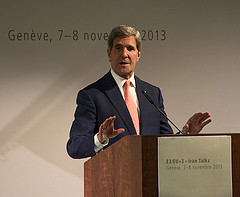Notwithstanding France’s simultaneously arrogant and craven grandstanding over Iran’s Arak heavy water reactor, the main reason for the failure of last week’s nuclear talks between the Islamic Republic and the P5+1 was the Obama administration’s imperious refusal to acknowledge Tehran’s right to enrich uranium under international safeguards. On this point, we want to highlight a recent post by Dan Joyner on Arms Control Law, titled, “Scope, Meaning and Juridical Implication of the NPT Article IV(1) Inalienable Right.”
Dan opens with a favorable reference to our recent post on the issue, see here; he then focuses on how to interpret the NPT Article IV(1) right to peaceful nuclear energy—a subject he has already written about at some length. He usefully inserts an excerpt from his excellent 2011 book, Interpreting the Nuclear Nonproliferation Treaty, Interpreting the Nuclear Nonproliferation Treaty Pages 79-84. This excerpt lays out Dan’s argument that the right to peaceful use of nuclear technology should be interpreted as “a full, free-standing right of all NNWS [non-nuclear-weapon states] party to the treaty, and not as a contingent right, contrary to the interpretation of some NWS [nuclear-weapon states].” After elaborating this basic point, Dan continues:
“The question of the scope of this right is one that continues to be debated. I have looked to the Lotus principle in international law (see the excerpt from my book) to show that the lawfulness of NNWS’, and in fact all states’, indigenous nuclear fuel cycle activities can be shown to derive from the absence of any prohibition of these activities in international law. This observation will, I have argued, serve to legally justify the full nuclear fuel cycle of activities within a NNWS, subject only to the positive requirements of Articles II and III of the NPT—i.e. no manufacture of nuclear explosive devices, and the conclusion of a safeguards agreement with the IAEA.
The question of just what exactly is the nature and scope of the right recognized in Article IV(1) of the NPT, and what are its juridical implications (e.g. in tension with the UN Security Council’s order in Resolution 1696 for Iran to cease uranium enrichment), is a subject that I have been thinking/researching about recently…These questions actually raise some very deep issues of international law, and analyzing them properly requires serious work…But let me say this here.
Article IV(1) of the NPT states that “Nothing in this Treaty shall be interpreted as affecting the inalienable right of all the Parties to the Treaty to develop research, production and use of nuclear energy for peaceful purposes without discrimination and in conformity with Articles I and II of this Treaty.” In my view, the recognition by over 190 states parties to the NPT that all states have such an inalienable right, which I interpret to include all elements of the full nuclear fuel cycle including uranium enrichment, strongly suggests that the right to peaceful nuclear energy research, production and use is one of the fundamental rights of states in international law. In my view, both fundamental and acquired rights of states should be understood to create in third parties, both states and international organizations, a legal obligation to respect those rights.
This means that other states and international organizations are under an international legal obligation not to act in serious prejudice of states’ rights. In the case of fundamental rights, this reciprocal obligation is of a jus cogens order, meaning that all states and international organizations are under a jus cogens order legal obligation not to act to seriously prejudice the fundamental rights of other states. When states or international organization do act in serious prejudice of a state’s fundamental rights, that action is an internationally wrongful act, and implicates the international responsibility of the acting state or international organization.
According to this analysis, UN Security Council Resolution 1696, which commands Iran to cease uranium enrichment, constitutes a violation of international law, at least as to this particular command, and is void of legal effect (See Article 25 of the UN Charter).
Note that the often heard rebuttal to this argument, which references Article 103 of the UN Charter, is in fact erroneous and inapplicable. Article 103 of the UN Charter provides that “In the event of a conflict between the obligations of the Members of the United Nations under the present Charter and their obligations under any other international agreement, their obligations under the present Charter shall prevail.” My analysis, which is based on the recognition of a fundamental right of states in international law, and the juridical implication of an obligation in other states and international organizations to respect that right, is unaffected and unanswered by this provision, which merely recognizes that in the case of a conflict between UN member states’ international legal obligations under the Charter, and their obligations deriving from other sources, the Charter obligations trump. It does not speak to the legal obligations of the Security Council as an organ of an international organization. Nor does it speak at all to conflicts between the obligations of the UN Charter, and the rights of states in international law. So again, Article 103 of the UN Charter is inapposite and inapplicable to this question.”
Dan’s work on these issues is both breathtakingly clear and, as far as we are concerned, definitive. (For more of his analysis on the illegality of Security Council resolutions calling on Iran to suspend uranium enrichment, we refer everyone to his brilliant article, “The Security Council as Legal Hegemon,” published last year in the Georgetown Journal of International Law, see here.)
More immediately, Dan’s work underscores an important reality: the Obama administration’s hegemonically abusive refusal to recognize Iran’s right to safeguarded enrichment is not just diplomatically and strategically counter-productive—it is illegal.
Flickr/US Mission Geneva
Reprinted from Going to Tehran Blog with permission.


